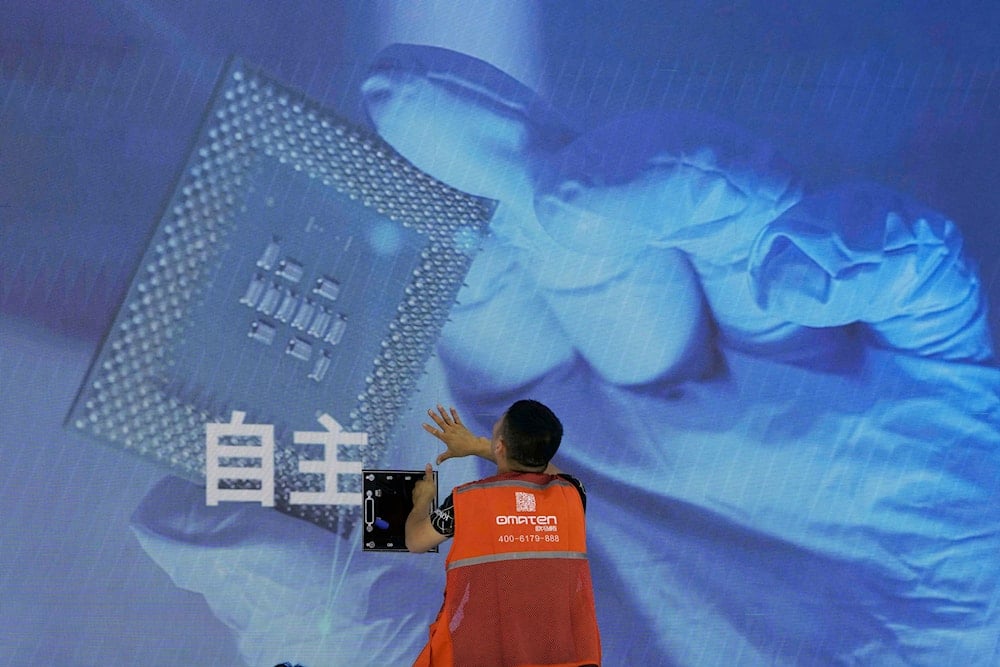US greed, policy missteps propelled China’s tech dominance: AP exposé
Decades of US greed and double standards let American tech fuel China’s rise, exposing Washington’s hypocrisy in the race for global technological power.
-

A worker checks the display panel showing a computer chip and the Chinese words for "Independence" at the booth for Chinese supercomputer manufacturer Sugon during the World AI Conference in Shanghai, Wednesday, July 5, 2023. (AP)
A sweeping Associated Press investigation has revealed that the US government, across five Republican and Democratic administrations, repeatedly allowed, and at times actively facilitated, American companies in selling technology allegedly used for surveillance to Chinese government agencies, police, and private firms.
Since September 2024, US lawmakers have tried four times to close a loophole allowing China to circumvent export restrictions on advanced AI chips by renting them through US cloud services.
Each attempt failed amid a surge of lobbying from more than 100 tech industry groups and their trade associations.
Despite ongoing concerns over national security, the AP found that US administrations have turned a blind eye to loopholes in export rules, allowing cloud-based services, third-party resellers, and outdated post-Tiananmen-era restrictions to be exploited.
For example, China purchased $20.7 billion in US chipmaking equipment in 2024 alone to bolster its domestic AI industry.
Profit over principles
Under the Trump administration, the US even struck deals with companies such as Nvidia and AMD to lift export restrictions on advanced chips to China, taking a revenue share in return. In parallel, the US government acquired a 10% stake in Intel worth $11 billion, tying taxpayer funds directly to profits from these tech exports.
Critics argue these policies allegedly enabled Beijing to expand its mass surveillance infrastructure.
Lobbying by US tech giants has been extensive. Analysis of disclosure filings shows that American tech and telecom firms, along with trade groups, spent hundreds of millions over the past two decades to influence legislation on China-related trade.
Bipartisan lawmakers have repeatedly failed to close loopholes allowing sensitive technologies, including AI, cloud computing, and facial recognition systems, to allegedly reach Chinese police and surveillance companies.
A key loophole
Cloud services are a key loophole, as per the report. Companies like Microsoft Azure and Amazon Web Services allow Chinese entities, including sanctioned firms, to access advanced AI tools and store surveillance footage overseas. Marketing materials indicate that firms such as Dahua and Hikvision, despite US sanctions, continue to offer networked surveillance solutions abroad.
Former and current US officials acknowledge the challenges of regulating dual-use technologies. Kevin Wolf, a former Commerce Department assistant secretary in charge of export controls, noted that mass surveillance often involves everyday devices, making blanket bans difficult without disrupting legitimate trade.
The AP investigation details decades of missed opportunities: from post-Tiananmen export controls narrowly targeting low-tech policing equipment to failed legislative efforts such as the Global Online Freedom Act of 2006 and continued Commerce Department promotion of US participation in Chinese security expos under multiple administrations.
Tech companies have defended their practices, with Nvidia stating that its products are not designed for surveillance, while Intel asserted compliance with export control policies. Microsoft and AWS have denied providing services directly to sanctioned Chinese surveillance firms, though marketing materials suggest otherwise.
Read more: China doubles down on tech self-reliance amid global tensions: FT

 3 Min Read
3 Min Read










